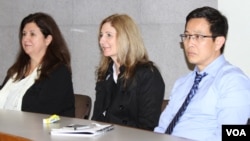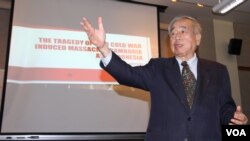Empathy and forgiveness should be at the heart of efforts to heal the wounds of Cambodia’s tragic history, according to academics attending a recent symposium.
Rutgers University-Newark hosted a rare event in the United States focusing on the legacy of genocide and atrocities including that of Cambodia. The symposium, titled Reflections in the Aftermath of War and Genocide: Empathy, Coexistence, Imagination and Resilience, brought together scholars from Cambodia and professors studying the country.
The discussion highlighted the contrast between the academics views on helpful forms of reconciliation and healing, and the efforts of the U.N.-backed Khmer Rouge tribunal toward the same goal. On Monday, former regime navy commander Meas Muth appeared in a court in Battambang to be formally charged with crimes against humanity and war crimes, in a sign that the hybrid tribunal’s troubled third case is now moving forward.
In Newark last month, one scholar who as a child survived the Khmer Rouge era said that victims should seek to understand the wider context in which perpetrators committed atrocities.
“Those cadres’ lives were also strongly affected by wars at that time, for example the U.S. bombings, Vietnam War and then the invasion of Cambodia,” Path Kosal, an assistant professor of Political Science at Brooklyn College in New York, told VOA Khmer.
“So, as victims, myself included, we had better try to understand more clearly the complex history of Cambodia; we cannot simply spotlight the 1975-1979 period,” said Kosal.
Cambodia went through nearly three decades of civil war and factional fighting beginning in the late 1960s, when the United States secretly bombed parts of the Southeast Asian nation. Fighting continued until the late 1990s, with the most tragic and horrifying period taking place when the Khmer Rouge took power.
Former Khmer Rouge leaders continue to insist that they wanted to protect Cambodia from foreign invasions, specifically by the country’s eastern neighbor Vietnam. But the radical Maoist group is blamed for the deaths of approximately 1.7 million people due to executions, starvation and overwork during its reign.
A handful of Khmer Rouge leaders and others deemed most responsible for the atrocity have so far been charged and sentenced by the United Nations-backed tribunal—known officially as the Extraordinary Chambers in the Courts of Cambodia—for crimes including, genocide, war crimes and crimes against humanity.
But critics say the court has done little to address the trauma experienced by much of the surviving population, or to promote true reconciliation.
“Just a tribunal that costs millions of dollars is not helpful,” said Benny, an Indonesian-born U.N diplomat who served in Cambodia in the 1990s.
Widyono, now an economics professor at the University of Connecticut, suggested that true reconciliation could take place in more informal settings. “Reconciliation can be brought about through other means such as religious gatherings,” he told VOA Khmer in an interview.
Eve Zucker, a visiting scholar at Rutgers University in New Jersey, said understanding war and genocide was one of the best approaches in helping the survivors of such mass violence. “It leads to healing for those who have suffered and creating a sustainable peace,” she said.
Laura McGrew, a consultant and author of a recent scholarly paper titled “Pathways to Reconciliation in Cambodia” said empathy and forgiveness may be key to reconciliation between the victims and perpetrators within communities.
“Maybe after time, you begin to imagine and say, ‘Oh, but he was very poor, he had no education, his boss ordered him to do it.’ So you begin to empathize and say, ‘Maybe I can forgive him or maybe I can understand why he did that so I don’t feel angry myself anymore,’” she said.
“You can put yourself in the other person’s shoes and really think about what that person suffered so that you can try to understand what happened, so then both people can understand what the other side experienced.”
She added that more healing-oriented programs could be offered for victims, such as for those dealing with post-traumatic stress disorder.
Neth Pheaktra, a spokesman for the Khmer Rouge tribunal, countered the criticism by saying that the trials contributed “effectively” to the national reconciliation process. Some survivors of the regime and family members have been brought into the trial process as civil parties, giving them an opportunity to speak in court about their experiences.
But many of those discussing the issue in Newark believe promoting a deeper understanding of Khmer Rouge cadres’ own experience might be a more helpful approach.
Kosal of Brooklyn College added that the tribunal might not be an effective mechanism to achieve reconciliation and healing for victims, since the “international and Western concept” was not compatible with Cambodian ideas about justice.
“Only when we clearly understand why those former Khmer Rouge perpetrators or cadres joined the Khmer Rouge revolution and what happened to them at that time can we forgive them and turn ourselves as victims into people who reconcile with them,” Kosal said.








